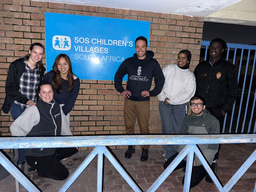Project Outline: Exploring the Relationship Between Childhood Adversity and Kindness

The Relationship Between Childhood Adversity and Kindness: Evidence to Inform Interventions
Supervisor: Dr. Ruth Speidel, Department of Psychology, University of Toronto Mississauga
Project Background
As someone who has overcome childhood adversity, I am passionate about research that benefits children who, unfortunately, are experiencing similar circumstances. My proposed research project aligns with my interests because it aims to improve our understanding of the factors associated with the development of kindness in children across varying contexts of adversity (e.g., financial hardship, unsafe neighbourhoods, traumatic events, racial discrimination). This is crucial because our knowledge of the origins and early antecedents of kindness is limited. By identifying protective factors for children experiencing adversity (e.g., early social-emotional capacities, self-regulation skills) findings from this research will inform developmentally sensitive strategies that will nurture kindness in children with diverse needs.
Research Question
How does exposure to adversity, such as poverty, family conflict, and community violence, affect pathways of kindness? Specifically, what protective factors can be identified from those who experience childhood adversity but remain kind to themselves and others?
Methodology
For this study, I will examine kind emotions and behaviours in children 2 to 3 years of age and assess how they differ for children facing adversity in the family (e.g., parental conflict, low socio-economic status) and/or in the community (e.g., neighborhood violence). I will use a multi-method approach including observations, behavioural tasks, physiological assessments, and questionnaires. The Laboratory for Social-Emotional Development and Intervention (SEDI) and Centre for Child Development, Mental Health, and Policy (CCDMP) at the University of Toronto’s Mississauga campus will serve as the hub for these procedures for the 6-week research period in Summer 1. Moreover, this proposed research project involves working on a pre-existing research project at SEDI: Adversity and the Development of Affective and Prosocial Trajectories (ADAPT) online wave; however, I would work on a distinct aspect of research individually. In addition to working with my research advisor, Dr. Ruth Speidel, I will also work closely with Dr. Melis Yavuz-Müren, a post-doctoral fellow at the SEDI lab, who oversees the ADAPT project.
Objectives
My goal of this project is to improve our understanding of the origins of childhood kindness, and by doing so, empower various stakeholders in assisting families and children who are experiencing adversity. By studying and promoting kindness, many known benefits of kindness could be perpetuated throughout society. Some of these benefits include, but are not limited to: kindness being linked with increasing serotonin, which is responsible for feelings of well-being (Fryburg, 2021); kindness being linked with positive social interactions with others (Yavuz et al., 2022); and kindness being linked with psychological distress reduction (Nelson-Coffey et al., 2021). Moreover, a potential application of my findings may involve conducting future research to develop comedy-based interventions (e.g., comedic improvisation workshops) that promote prosocial behaviour (i.e., kindness), which may mitigate the risks associated with childhood adversity. Therefore, detecting early signs of childhood kindness and understanding how to promote it, which is important for developing healthy communities and societies, is the anticipated key achievement of my research.
References
Fryburg, D. A. (2021). Kindness as a stress reduction-health promotion intervention: A review of the psychobiology of caring. American Journal of Lifestyle Medicine, 16(1), 89–100. https://doi.org/10.1177/1559827620988268
Nelson-Coffey, S. K., Bohlmeijer, E. T., & Schotanus-Dijkstra, M. (2021). Practicing other-focused kindness and self-focused kindness among those at risk for mental illness: Results of a randomized controlled trial. Frontiers in Psychology, 12, 741546. https://doi.org/10.3389/fpsyg.2021.741546
Yavuz, H. M., Colasante, T., & Malti, T. (2022). Parental warmth predicts more child prosocial behavior in children with better emotion regulation: A longitudinal psychophysiological study. British Journal of Developmental Psychology, 40(4), 539–556. https://doi.org/10.1111/bjdp.12425
![[Closed] LiA Opportunity: SOS Children's Villages Cape Town – Summer 2026](https://images.zapnito.com/cdn-cgi/image/metadata=copyright,format=auto,quality=95,width=256,height=256,fit=scale-down/https://images.zapnito.com/users/647804/posters/9db789af-7f05-417f-ab56-098d23e845d5_medium.jpeg)




Please sign in
If you are a registered user on Laidlaw Scholars Network, please sign in
I loved hearing about this research project when we met. It addresses so many issues that I am passionate about: overcoming adversity, early years intervention, mental health, positive social engagement and cultivating character. Good luck with your research @Youness Robert-Tahiri. I can't wait to read it.
Thank you for your continued support, Susanna! I appreciate it.